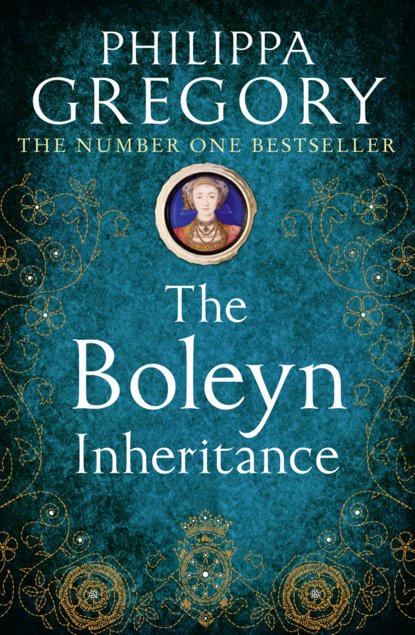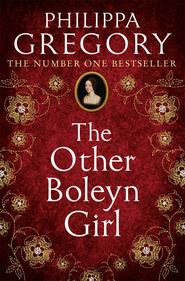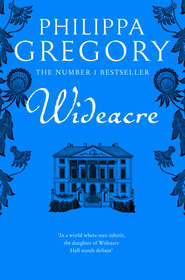По всем вопросам обращайтесь на: info@litportal.ru
(©) 2003-2024.
✖
The Boleyn Inheritance
Автор
Год написания книги
2019
Настройки чтения
Размер шрифта
Высота строк
Поля
I stand beside her on one side and one of her German friends is on the other so that he can tell her what is being said. Lord Lisle is there, of course, and Archbishop Cranmer. He is devoting himself to being pleasing, of course. She may be Cromwell’s candidate, and thus an asset for his rival; but his worst fear must have been that the king would bring in a Papist princess, and this reforming archbishop would see his church turned back to the old ways once more.
Some of the court are at the windows to see the baiting, some are gossiping quietly at the back of the room. I cannot hear exactly what is being said, but I think there are more than Lady Browne who think that the Lady Anne is not well-suited to the great position that she has been called on to fill. They judge her harshly for her shyness and her lack of speech. They blame her for her clothes and they laugh at her for not being able to dance or sing or play a lute. This is a cruel court, devoted to frivolity, and she is a girl easy to use as a butt for sarcasm. If this goes on, what will happen? She and the king are all but married. Nothing can stop the wedding. He can hardly send her home in disgrace, can he? For the crime of wearing a heavy hood? Not even the king can do that, surely? Not even this king can do it? It would bring Cromwell’s treaty down about his ears, it would bring down Cromwell himself, it would leave England friendless facing France and Spain without any Protestant alliance at our back. The king will never risk it, I am sure. But I cannot imagine what will happen.
Down in the yard below they are getting ready to release the bull, his handler unclips the rope from the ring in his nose, skips out of the way, vaults over the boards and the men who have been sitting on the wooden benches rise to their feet and start to shout bets. The bull is a great animal with heavy shoulders and a thick, ugly head. He turns this way and that, spotting the dogs from one little eye and then the other. The dogs are none too eager to be the first to run in, they are afraid of him in his power and his strength.
I feel a little breathless. I have not seen a bull-baiting since I was last at court, I had forgotten what a savage excitement it is to see the yapping dogs and the great beast that they will pull down. It is rare to see a bull as big as this one, his muzzle scarred from earlier fights, his horns barely blunted. The dogs hang back and bark, sharp, persistent barks with the thrilling sound of fear behind them. He turns from one to another, threatening them with the sweep of his horns, and they fall back into a circle around him.
One rushes in, and at once the bull spins, you would not think such a great animal could move so quickly, his head ploughs low and there is a scream like a human cry from the dog as the horns buffet his body, his bones are broken for sure. He is down and cannot crawl away, he is yelping like a baby, the bull stands over him, his head down, and grinds the side of his great horn into the screaming dog.
I find I am crying out, though whether for the dog or for the bull I couldn’t say. There is blood on the cobbles but the bull’s attack has left him unguarded to the other dogs, and another darts in and takes a bite at his ear. He turns, but at once another fastens on his throat and hangs there for a moment, his white teeth bared and gleaming in the torchlight, while the bull bellows for the first time and the roar of it makes all the maids scream and me among them, and everyone is now crowding to the windows to see as the bull rakes his head round and the dogs fall back and one of them howls with rage.
I find I am trembling, crying out for the dogs to go on! Go on! I want to see more, I want to see all of it, and Lady Anne beside me is laughing, she is excited too, she points to the bull where his ear is bleeding, and I nod and say, ‘He will be so angry! He will kill them for sure!’ And then suddenly, a bulky man I don’t know, a stranger smelling of sweat and wine and horses, pushes in front of us, into the window bay where we are standing, pushes rudely by me, and says to the Lady Anne, ‘I bring you greetings from the King of England,’ and he kisses her, full on the mouth.
At once I turn to shout for the guards. This is an old man of nearly fifty, a fat man, old enough to be her father. She thinks at once that he is some drunk fool who has managed to push his way into her chamber. She has greeted a hundred men, a thousand men, with a smile and an extended hand and now this man, wearing a marbled cape and a hood pulled over his head, comes up to her and pushes his face into hers and puts his slobbery mouth on hers.
Then I bite off my shout of alarm, I see his height, and I see the men who have come in with him in matching capes, and I know him at once for the king. At the same moment, like a miracle, at once he does not seem old and fat and distasteful. As soon as I know he is the king I see the prince that I have always seen, the one they called the handsomest prince in Christendom, the one that I was in love with myself. This is Henry, King of England, one of the most powerful men in the entire world, the dancer, the musician, the sportsman, the courtly knight, the lover. This is the idol of the English court, as big as the bull in the yard below us, as dangerous as a bull when wounded, as likely to turn on any challenger and kill.
I don’t curtsey because he is in disguise. I learned from Katherine of Aragon herself that one should never see through his disguises, he loves to unmask and wait for everyone to exclaim that they had no idea who the handsome stranger was, that they admired him for himself, without knowing that he was our wonderful young king.
And so, because I cannot warn Lady Anne, the scene in our gallery becomes a baiting to equal what is going on, bloodily, in the courtyard below us. She pushes him away, two firm hands against his fat chest, and her face, sometimes so dull and stolid, is burning with colour. She is a modest woman, an untouched girl, and she is horrified that this man should come and insult her. She rubs the back of her hand over her face to erase the taste of his lips. Then, terribly, she turns her head and spits his saliva from her mouth. She says something in German that needs no translation, clearly it is a curse against this commoner who has presumed to touch her, to breathe his wine-scented breath into her face.
He stumbles back, he, the great king, almost falls back before her contempt. Never in his life has a woman pushed him away, never in his life has he ever seen any expression in any woman’s face but desire and welcome. He is stunned. In her flushed face and bright, offended gaze he sees the first honest opinion of himself that he has ever known. In a terrible, blinding flash he sees himself as he really is: an old man, long past his prime, no longer handsome, no longer desirable, a man that a young woman would push roughly away from her because she could not stand his smell, because she could not bear his touch.
He reels back as if he has taken a mortal blow to the face, to his heart. I have never seen him like this before. I can almost see the thoughts running behind his stunned, flabby face. The sudden realisation that he is not handsome, the realisation that he is not desirable, the terrible realisation that he is old and ill and one day he will die. He is no longer the handsomest prince in Christendom, he is a foolish old man who thought that he could put on a cape and a hood and ride out to meet a girl of twenty-four, and she would admire the handsome stranger, and fall in love with the king.
He is shocked to his soul, and now he looks foolish and confused like a muddled grandfather. Lady Anne is magnificent, she is drawn up to her full height and she is angry, she is powerful, she is standing on her dignity and she shoots a look at him which dismisses him from her court as a man that no-one would want to know. ‘Leave me,’ she says in heavy-accented English, and she turns her shoulder on him as if she would push him away again.
She looks around the room for a guard to arrest this intruder, and she notices for the first time that no-one is springing to save her, we are all appalled, no-one knows what they can say or do to recover this moment: Lady Anne outraged, the king humbled in his own eyes, thrown down before us all. The truth of the king’s age and decay is suddenly, painfully, unforgiveably apparent. Lord Southampton steps forwards but is lost for words; Lady Lisle looks at me and I see my shock mirrored in her face. It is a moment of such intense embarrassment that all of us – we skilled flatterers, courtiers, liars – are lost for words. The world we have been building for thirty years, around our prince who is ageless, eternally handsome, irresistibly desirable, has been shattered about our ears – and by a woman we none of us respect.
He turns wordlessly, he almost stumbles as he goes, his stinking leg giving way beneath him, and Katherine Howard, that clever, clever little girl, catches her breath in a gasp of absolute admiration and says to him: ‘Ooh! Forgive me, sir! But I am new to court myself, a stranger like you. May I ask – who are you? What is your name?’
Katherine, Rochester, 31 December 1539 (#ulink_4dce7bdf-9a61-57a6-be9e-9e6933a66941)
I am the only person to see him come in. I don’t like bull-baiting, or bears, or cockfighting, or anything like that, I think it’s just downright nasty – and so I am standing a little back from the windows. And I am looking round, actually, I am looking at a young man that I had seen earlier, such a handsome young man with a cheeky smile, when I see the six of them come in, old men, they must all be thirty at the least, and the big old king at the front, and they are all wearing the same sort of cape, like a masquing costume, so I guess at once that it is him, and that he has come in disguise like a knight errant, silly old fool, and that he will greet her and she will pretend not to know him, and then there will be dancing. Really, I am delighted to see him because this makes it a certainty that there will be dancing and so I am wondering how I can encourage the handsome young man to be near me in the dance.
When he kisses her it all goes terribly wrong. I can see at once that she has no idea who he is, someone should have warned her. She thinks he is just some drunk old man who has staggered in to kiss her for a wager, and of course she is shocked, and of course quite repelled, because when he is in a cheap cloak and not surrounded by the greatest court in the world he does not look at all like a king. In truth, when he is in a cheap cloak and with his companions, also dressed poorly, he looks like some common merchant, with a waddling walk and a red nose, who likes a glass of wine, and hopes to go to court and see his betters. He looks like the sort of man my uncle would not acknowledge if he called out in the street. A fat old man, a vulgar old man, like a drunk sheep farmer on market day. His face is terribly bloated, like a great round dish of dripping, his hair is thinning and grey, he is monstrously fat, and he has an old injury in his leg that makes him so lame that he rolls in his walk like a sailor. Without his crown he is not handsome, he looks like anybody’s fat old grandfather.
He falls back, she stands on her dignity, rubbing her mouth to take the smell of his breath away, and then – it is so awful I could almost scream with shock – she turns her head and spits out the taste of him. ‘Leave me,’ she says and turns her back on him.
There is utter, dreadful silence, nobody says a word, and suddenly I know, as if my own cousin Anne Boleyn is at my side telling me, what I should do. I am not even thinking of the dancing and the young man, for once I am not even thinking of myself, and that almost never happens. I just think, in a flash, that if I pretend not to know him, then he can go on not knowing himself, and the whole sorry masque of this silly old man and his gross vanity will not tumble about our ears. I just feel sorry for him, to tell the truth. I just think that I can spare him this awful embarrassment of bouncing up to a woman and having her slap him down like a smelly old hound. If anyone else had said anything then I would have stayed silent. But nobody says anything and the silence goes on and on, unbearably, and he stumbles back, he almost falls back into me, and his face is all crumpled and confused and I am so sorry for him, poor humbled old fool, that I say, I coo: ‘Ooh! Forgive me, sir! But I am new to court myself, a stranger like you. May I ask – who are you?’
Jane Boleyn, Rochester, 31 December 1539 (#ulink_2ca5ad6a-3314-55d8-829a-c44aefb751bd)
Lady Browne is ordering the maids to their beds in a bellow as if she were a Yeoman of the Guard. They are over-excited and Katherine Howard among them is the centre of it all, as wild as any of them, a true Queen of the May. How she spoke to the king, how she peeped up at him from under her eyelashes, how she begged him, as a handsome stranger, new-come to court, to ask the Lady Anne for dancing, is being mimicked and re-enacted till they are drunk with their own laughter.
Lady Browne is not laughing, her face is like thunder, so I hustle the girls into bed and tell them that they are all very foolish and that they would do better to copy their lady, the Lady Anne, and show proper dignity, than mimic Katherine Howard’s free and forward ways. They slip into their beds two by two like pretty angels and we blow out the candle and leave them in the darkness and lock the door. We have hardly turned away before we hear them whispering, but no power on earth can make girls behave well; and we do not even try.
‘Are you troubled, Lady Browne?’ I ask considerately.
She hesitates, she is longing to confide in someone, and I am here at her side, and known to be discreet.
‘This is a bad business,’ she says heavily. ‘Oh, it all passed off pleasantly enough in the end, with the dancing and the singing and Lady Anne recovered quickly enough as soon as you had explained to her; but this is a bad, bad business.’
‘The king?’ I suggest.
She nods and folds her lips over as if she would stop herself saying more.
‘I am weary,’ I say. ‘Shall we take a glass of warm ale together before we go to our beds? Sir Anthony is staying here tonight, is he not?’
‘God knows he won’t join me in my rooms for hours,’ she says unguardedly. ‘I doubt if any of the king’s circle will sleep tonight.’
‘Oh?’ I say. I lead the way into the presence chamber. The other ladies have gone to bed, the fire is burning low, but there is a jug of ale set at the fireside and half a dozen tankards. I pour us both a drink. ‘Trouble?’
She sits in her chair and leans forwards to whisper. ‘My lord husband tells me that the king swears that he will not marry her.’
‘No!’
‘He does. He does. He swears it. He says that he cannot like her.’
She takes a long draw on the ale and looks at me over the top of the mug.
‘Lady Browne, you must have this wrong …’
‘I have it from my husband this very night. The king seized him by the collar, almost by the throat, as soon as we retired, and said that the moment he saw Lady Anne, he had been struck with consternation, and that he saw nothing in her that he had been told.’
‘He said that?’
‘Those very words.’
‘But he seemed so happy as we left?’
‘He was as truly happy just as Katherine Howard was truly ignorant of his identity. He is as much a happy bridegroom as she is an innocent child. We are all actors here, but the king will not play the part of eager bridegroom.’
‘He has to, they are betrothed and the contract signed.’
‘He does not like her, he says. He cannot like her, he says, and he is blaming the men who made this marriage for him.’
I have to get this news to the duke, he has to be warned before the king gets back to London.
‘Blaming the men who made the marriage?’
‘And those who brought her to him. He is furious.’
‘He will blame Thomas Cromwell,’ I predict quietly.
‘Indeed.’
‘But what of the Lady Anne? Surely, he cannot refuse her?’












